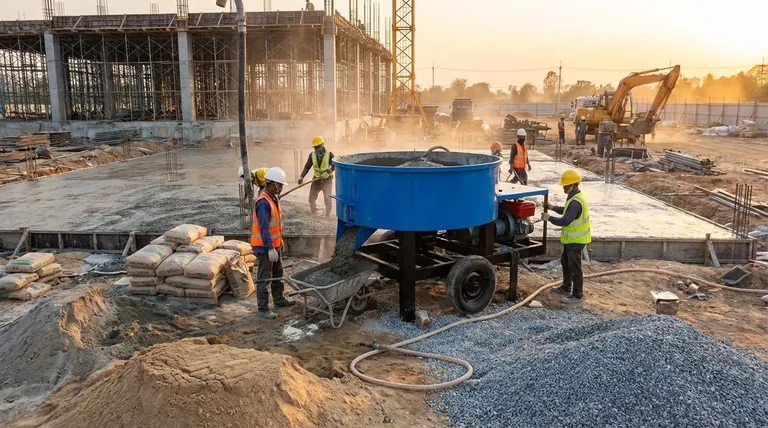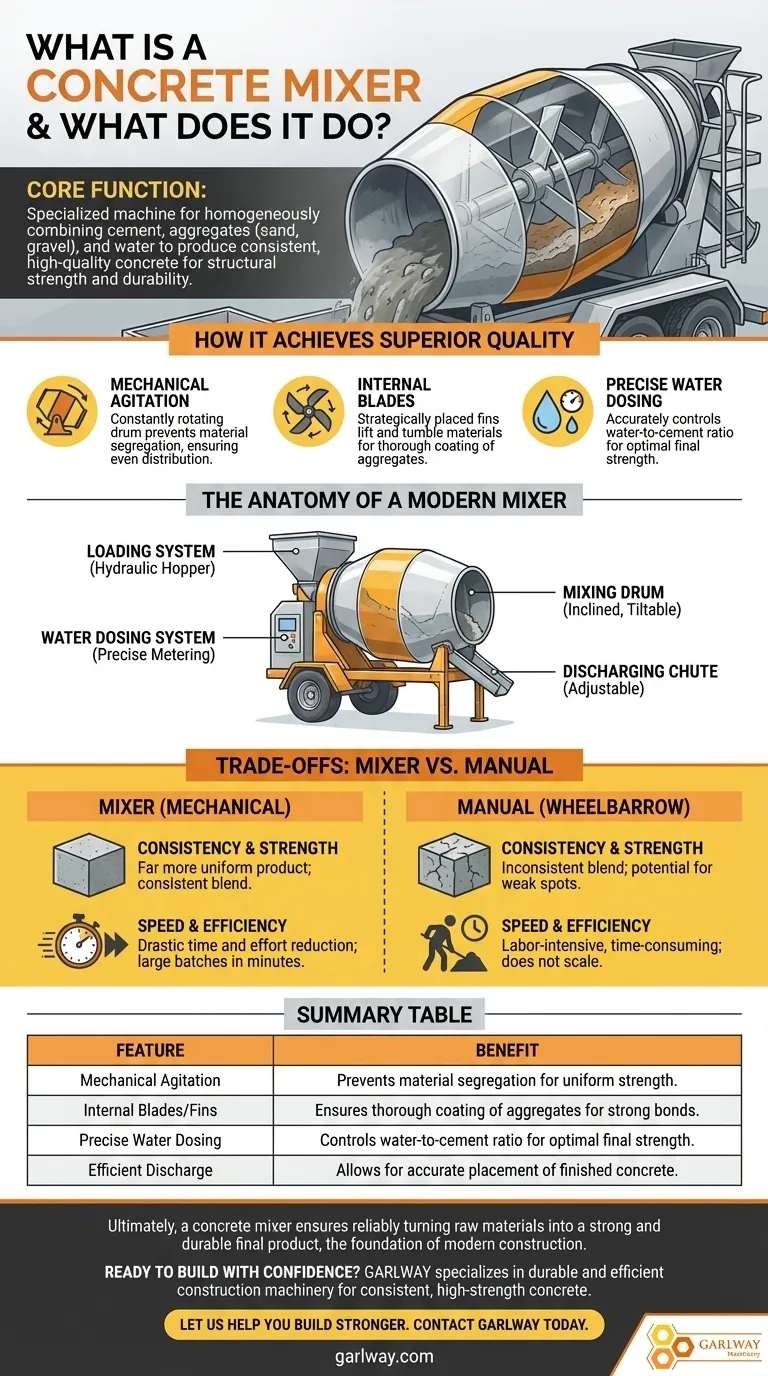In essence, a concrete mixer is a specialized machine designed to homogeneously combine cement, aggregates like sand and gravel, and water to produce concrete. Its core function is to automate this process, ensuring a consistent, high-quality mixture that is crucial for the strength and durability of the final structure.
The true value of a concrete mixer lies not just in saving labor, but in achieving a level of material consistency that is nearly impossible to replicate by hand. This homogeneity is the key to creating strong, reliable, and long-lasting concrete for any construction project.

How a Concrete Mixer Achieves Superior Quality
A mixer's effectiveness comes from its mechanical design, which is engineered to solve the core challenges of creating high-grade concrete. It goes far beyond simple stirring.
The Principle of Mechanical Agitation
The constantly rotating drum is the heart of the mixer. This continuous motion keeps heavier aggregates suspended and evenly distributed throughout the cement paste.
This process prevents the materials from segregating, which would otherwise create weak spots in the final cured concrete.
Internal Blades for Thorough Mixing
Inside the drum, strategically placed blades or fins lift and tumble the materials. This folding action ensures that every particle of sand and gravel is fully coated with the cement-water paste.
This thorough coating is what creates the strong chemical bond necessary for high-strength concrete.
Measuring Mixing Efficiency
The definitive measure of a mixer's efficiency is the homogeneity of its output.
Professionals can analyze samples to verify the even distribution of all solid components, from coarse aggregates to fine cement particles, throughout the batch.
The Anatomy of a Modern Mixer
While designs vary, most concrete mixers share a common set of components that work together to streamline the production process from raw materials to finished product.
The Loading System
The process begins with loading the raw materials. Many mixers use a hydraulic hopper to efficiently lift and deposit the cement and aggregates into the drum.
The Water Dosing System
Water is added through a precise dosing system. Controlling the water-to-cement ratio is one of the most critical factors in determining the final strength of the concrete.
The Mixing Drum
This is the central vessel where the mixing occurs. The drum is often inclined and can be tilted to control the mixing action and, ultimately, to pour out the finished concrete.
The Discharging Chute
Once the concrete is properly mixed, it is discharged down an adjustable chute, allowing operators to accurately place it where it's needed, whether into a wheelbarrow, a concrete pump, or directly into forms.
Understanding the Trade-offs: Mixer vs. Manual
Using a mechanical mixer is not always the only option, but it is almost always the superior one for any project where structural integrity is a concern.
Consistency and Strength
A mechanical mixer produces a far more uniform product. Manual mixing, typically done in a wheelbarrow, often results in an inconsistent blend with wet or dry spots, which directly translates to weak, unreliable concrete.
Speed and Efficiency
The primary benefit for any project of significant size is the drastic reduction in time and physical effort. A mixer can produce a large batch of high-quality concrete in minutes, a task that would take much longer manually.
Cost and Scale
The main drawback of a mixer is the initial investment and maintenance. For extremely small, non-structural jobs like setting a single post, manual mixing can be sufficient. However, it does not scale effectively and becomes a liability for larger projects like foundations or slabs.
Making the Right Choice for Your Goal
Selecting the correct mixing method depends entirely on the scale and structural requirements of your project.
- If your primary focus is a small, non-structural repair: Manual mixing may suffice, but be extremely diligent about achieving a uniform consistency to avoid creating a weak patch.
- If your primary focus is a project like a patio, walkway, or small foundation: A portable batch mixer is the minimum requirement to ensure consistent quality and strength across the entire job.
- If your primary focus is professional construction: Industrial-grade batch or continuous mixers are non-negotiable for delivering the required volume, quality control, and efficiency.
Ultimately, understanding the function of a concrete mixer is understanding the foundation of modern construction: reliably turning raw materials into a strong and durable final product.
Summary Table:
| Feature | Benefit |
|---|---|
| Mechanical Agitation | Prevents material segregation for uniform strength. |
| Internal Blades/Fins | Ensures thorough coating of aggregates for strong bonds. |
| Precise Water Dosing | Controls water-to-cement ratio for optimal final strength. |
| Efficient Discharge | Allows for accurate placement of finished concrete. |
Ready to build with confidence?
For construction companies and contractors, the quality of your concrete directly impacts the integrity and longevity of your projects. GARLWAY specializes in durable and efficient construction machinery, including concrete mixers and batching plants designed to deliver the consistent, high-strength concrete your business depends on.
Let us help you build stronger. Contact GARLWAY today to discuss the right concrete solution for your next project.
Visual Guide

Related Products
- Ready Mixer Machine for Construction Ready Mix Machinery
- Commercial Construction Mixer Machine for Soil Cement Mixing Concrete
- Auto Concrete Cement Mixer Machine New
- JDC350 Small Cement Concrete Mortar Mixer
- HZS90 Large Multiquip Concrete Mixers for Construction
People Also Ask
- Why are vertical shaft mixers preferred for precast concrete? Unlock Superior Speed and Consistency
- Do you put water or cement in a cement mixer first? Master the Professional Layering Method
- How can self-loading mixers be used in precast production? A Mobile Solution for Remote & Small-Batch Projects
- What are the main types of concrete mixers available? Find the Right Mixer for Your Project
- What other maintenance tasks are important for concrete mixer trucks? Prevent Costly Downtime & Ensure Safety
- How long can cement be kept in a cement truck before it starts hardening? Ensure Structural Integrity on Your Site
- What projects are continuous mixers typically used for? Powering Massive Dams, Bridges, and High-Rises
- How does a cement truck mix and transport concrete? Master the Mechanics for Efficient Delivery


















